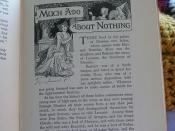Much Ado About Nothing exemplifies a kind of deliberately puzzling title that seems to have been popular in the late 1590s (compare, "As You Like It0/00). Indeed, the play is about nothing; it merely follows the relationships of Claudio and Hero, and in the end, the play culminates in the two other main characters falling in love, which, because it was an event that was quite predictable, proves to be much ado about nothing.
The pronunciation of the word "nothing" would, in the late 16th Century, have been "noting," and so the title also apparently suggests a pun on the word, "noting," and on the use of the word "note" as an expression of music. In II.2 (l.54), Balthasar is encouraged to sing, but declines, saying, "note this before my notes; there's not a note of mine that's worth the noting." However, Don Pedro retorts, "Note notes, forsooth, and nothing," playing on Balthasar's words, and also demanding that he pay attention to his music and nothing else.
In addition, much of the play is dedicated to people "noting" (or observing) the actions of others (such as the trick played on Beatrice and Benedick by Leonato, Hero and Claudio); they often observe and overhear one another, and consequently make a great deal out of very little.
At the beginning of the play, Claudio and Hero eventually come to admire one another, and Benedick and Beatrice play off each others' wit in a manner that is all too cosy to be convincingly vicious. It ends with Claudio and Hero's marriage, and with Beatrice and Benedick proclaiming their engagement. The irony is that, were it not for the fuss created over the nothingness in between, the play would indeed be about nothing. The middle section of the play centres on the false...


